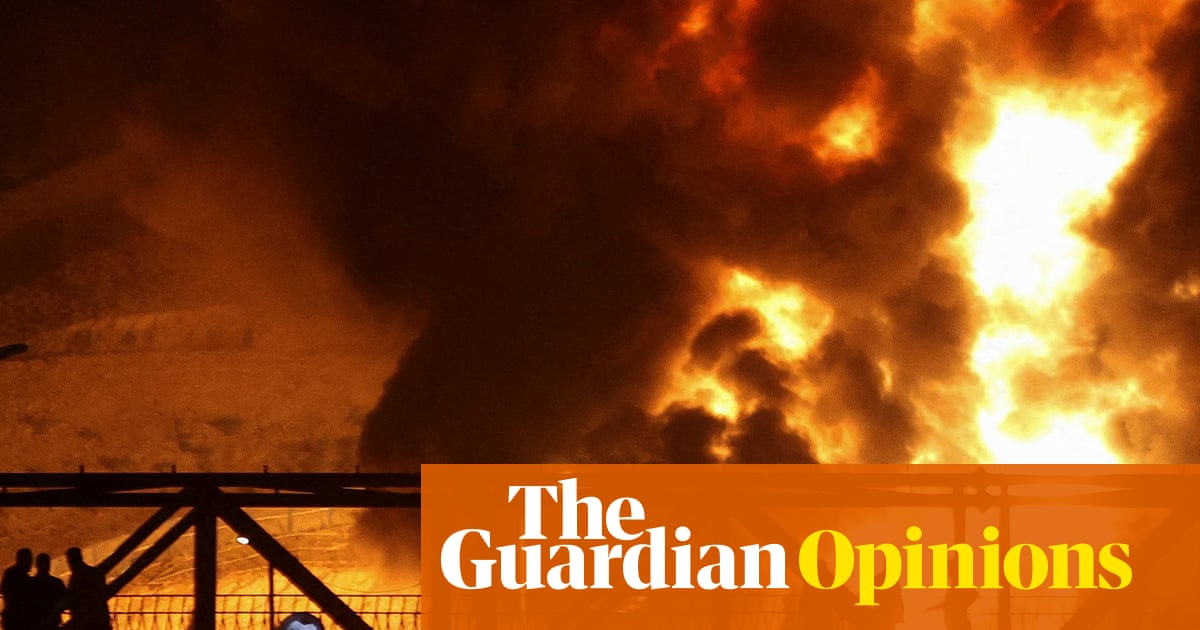This was not inevitable. This is a war Israel chose. It could have been prevented. Diplomatic talks were ongoing when the bombers took off for Iran. Israel’s continuing, illegal, unjustified airstrikes are unlikely to achieve their stated aim – permanently ending Tehran’s presumed efforts to build nuclear weapons – and may accelerate it. They must stop now. Likewise, Iran must halt its retaliation immediately and drop itsescalatory threats to attack US and UK bases.
This conflict is not limited, as was the case last year, to tit-for-tat exchanges and “precision strikes” on a narrow range of military targets. It’s reached a wholly different level. Potentially nothing is off the table.Civilians are being killedon both sides. Leaders are targets. The rhetoric is out of control. With Israel fighting on several fronts, and Iran’s battered regime backed against a wall, the Middle East is closer than ever to a disastrous conflagration.
Reasons can always be found to go to war. The roots of major conflicts often reach back decades – and this is true of the Israel-Iran vendetta, which dates to the 1979 Islamic revolution. The so-called “shadow war” between the twointensified in recent years. Yet all-out conflict had been avoided, until now. So who is principally to blame for this sudden, unprecedented explosion?
Answer: three angry old men whose behaviour raises serious doubts about their judgment, common sense, motives and even their sanity.
The fact that one of them – Benjamin Netanyahu, Israel’s prime minister – has actively sought a showdown with Iran for years does not mean it had to happen. The fact the Tehran regime is unusually vulnerable after Israel’s attacks last year and the defeat of its Hezbollah ally does not somehow legitimise a surprise assault on its sovereign soil. It’s true that UN nuclear inspectorssay Iran is breaking treaty obligations. But that doesn’t amount to a green light for war.
Netanyahu, 75, is unfit to lead Israel, let alone make life-or-death decisions on its behalf. He failed to protect Israelis from the 2023 terror attacks,then dodged responsibility. He has failed to fulfil his vow to destroy Hamas and bring back the hostages, yet his soldiers have killed more than55,000 Palestinians in Gazain the process. Heinvaded LebanonandSyria. Now it’s Iran. Where will he stop? Will he fight Turkey next? It’s not out of the question.
War is Netanyahu’s choice. It’s whatgets him out of bed in the morning. It’s what keeps him and hisUK-sanctioned far-right croniesin office and out of jail. His actions have inflicted extraordinary damage on his country’s reputation, fuelling antisemitism globally. He claims Israel is fighting for its existence – but his own political survivalis a prime consideration, too. Netanyahu has beenindicted for alleged war crimes in Gaza. He should be arrested, not defended and enabled, before any more crimes are committed.
Ayatollah Ali Khamenei, Iran’s bellicose supreme leader, is the second leading culprit. He should have been put out to grass in Qom years ago. The 86-year-old squats atop a repressive, corrupt theocratic regime that has lost touch with the society and people it ostensibly serves. Elections are fixed, judges are bent, media censorship is pervasive. The regime’s military incompetence, economic mismanagement and brutal persecution of young women, gay men andhuman rights defenders such as Nasrin Sotoudehare notorious.
Like Netanyahu, Khamenei is backed by hardline conservatives and opposed by reformers, but it’s him who calls the shots. His suspiciousinsistence on stepping up uranium enrichment, even though civil applications are lacking, ultimately gave Netanyahu an opening. Although he is said to be unwell, Khamenei is a key reason why Iranwill not abandon its nuclear programme. Even without him, Netanyahu’s idea that it can be totally eliminated is fantasy.
This blindspotmay be the regime’s final undoing. Israel’s strikes have killed senior military leaders and damaged nuclear facilities and ballistic missile and drone forces. Khamenei himself, and Iran’s vital energy exports, may be next. Ina patronising video, Netanyahu urged Iranians to rise up and seize their “freedom”. Many would like to. The difficulty with such advice, coming from a tainted source, is that it could have the opposite effect of rallying the public, and Arab leaders, around the regime.
Iran’sthreats to attack US, British and French basesand ships if they help defend Israel, and toclose the strait of Hormuz, heighten the risk of full-scale war and a global energy shock that could hurt the west and benefit Russia. These are some of the direct consequences of Donald Trump’s weak, vacillating stance.
Trump, 79, is the third man in this avoidable tragedy. He previously said he preferred tonegotiate a new nuclear dealwith Iran, havingidiotically trashed the previous one. But he couldn’t decide on terms, and his amateurish negotiators kept changing their position. That was partly because Trump, as with Palestine and Ukraine, is too idle to study the details. He wings it instead, trusting to instincts that are invariably bad. That makes him easy prey for wily operators such as Netanyahu.
Trump’s feeble ineptitude meant that when Israel’s leader insisted last week that the time was right for an all-out attack on Iran, he folded. Typically, once the attack began, he switched,trying to claim creditand issuing flatulent threats of his own. Each time he opens his mouth, Trump inadvertently confirms Iran’s suspicions that the US and Israel are acting in close concert.
An urgent message for Keir Starmer: anyone who still thinks Trump has even the remotest idea what he’s doing when confronting the big international questions of the day should study the alarming events of the past week. Whether he is selling out to Vladimir Putin, weaponising tariffs, botching a Gaza ceasefire or bullying neighbours,Trump is a total menace. Far better, and safer, for Britain to bypass him and try as much as possible to act independently of the US from now on.
These angry old men could get us all killed.
Simon Tisdall is a Guardian foreign affairs commentator
